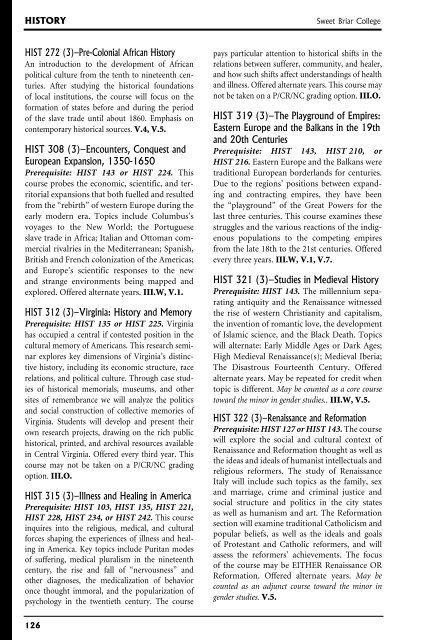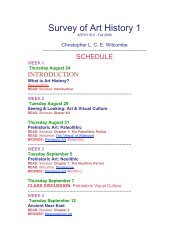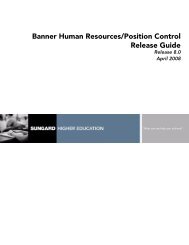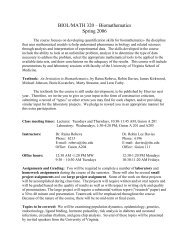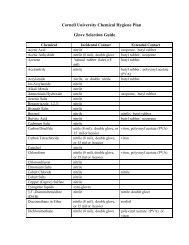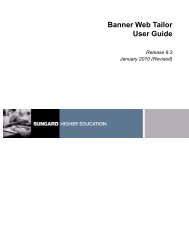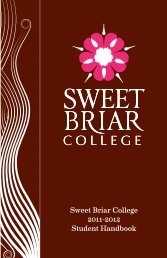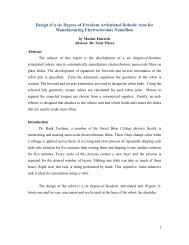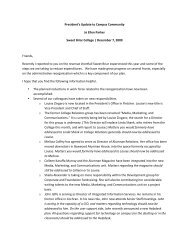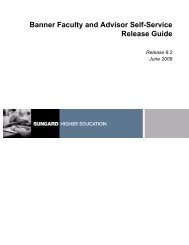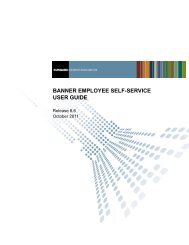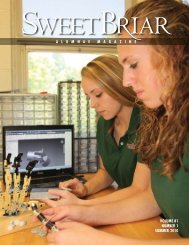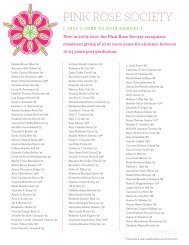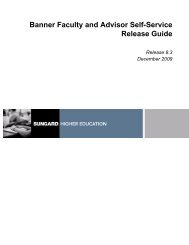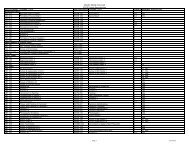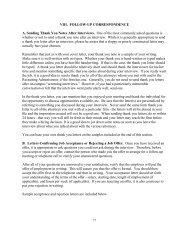history<strong>Sweet</strong> <strong>Briar</strong> <strong>College</strong>HIST 272 (3)–Pre-Colonial African HistoryAn introduction to the development of Africanpolitical culture from the tenth to nineteenth centuries.After studying the historical foundationsof local institutions, the course will focus on theformation of states before and during the periodof the slave trade until about 1860. Emphasis oncontemporary historical sources. V.4, V.5.HIST 308 (3)–Encounters, Conquest andEuropean Expansion, 1350-1650Prerequisite: HIST 143 or HIST 224. Thiscourse probes the economic, scientific, and territorialexpansions that both fuelled and resultedfrom the “rebirth” of western Europe during theearly modern era. Topics include Columbus’svoyages to the New World; the Portugueseslave trade in Africa; Italian and Ottoman commercialrivalries in the Mediterranean; Spanish,British and French colonization of the Americas;and Europe’s scientific responses to the newand strange environments being mapped andexplored. Offered alternate years. III.W, V.1.HIST 312 (3)–Virginia: History and MemoryPrerequisite: HIST 135 or HIST 225. Virginiahas occupied a central if contested position in thecultural memory of Americans. This research seminarexplores key dimensions of Virginia’s distinctivehistory, including its economic structure, racerelations, and political culture. Through case studiesof historical memorials, museums, and othersites of remembrance we will analyze the politicsand social construction of collective memories ofVirginia. Students will develop and present theirown research projects, drawing on the rich publichistorical, printed, and archival resources availablein Central Virginia. Offered every third year. Thiscourse may not be taken on a P/CR/NC gradingoption. III.O.HIST 315 (3)–Illness and Healing in AmericaPrerequisite: HIST 103, HIST 135, HIST 221,HIST 228, HIST 234, or HIST 242. This courseinquires into the religious, medical, and culturalforces shaping the experiences of illness and healingin America. Key topics include Puritan modesof suffering, medical pluralism in the nineteenthcentury, the rise and fall of “nervousness” andother diagnoses, the medicalization of behavioronce thought immoral, and the popularization ofpsychology in the twentieth century. The coursepays particular attention to historical shifts in therelations between sufferer, community, and healer,and how such shifts affect understandings of healthand illness. Offered alternate years. This course maynot be taken on a P/CR/NC grading option. III.O.HIST 319 (3)–The Playground of Empires:Eastern Europe and the Balkans in the 19thand 20th CenturiesPrerequisite: HIST 143, HIST 210, orHIST 216. Eastern Europe and the Balkans weretraditional European borderlands for centuries.Due to the regions’ positions between expandingand contracting empires, they have beenthe “playground” of the Great Powers for thelast three centuries. This course examines thesestruggles and the various reactions of the indigenouspopulations to the competing empiresfrom the late 18th to the 21st centuries. Offeredevery three years. III.W, V.1, V.7.HIST 321 (3)–Studies in Medieval HistoryPrerequisite: HIST 143. The millennium separatingantiquity and the Renaissance witnessedthe rise of western Christianity and capitalism,the invention of romantic love, the developmentof Islamic science, and the Black Death. Topicswill alternate: Early Middle Ages or Dark Ages;High Medieval Renaissance(s); Medieval Iberia;The Disastrous Fourteenth Century. Offeredalternate years. May be repeated for credit whentopic is different. May be counted as a core coursetoward the minor in gender studies.. III.W, V.5.HIST 322 (3)–Renaissance and ReformationPrerequisite: HIST 127 or HIST 143. The coursewill explore the social and cultural context ofRenaissance and Reformation thought as well asthe ideas and ideals of humanist intellectuals andreligious reformers. The study of RenaissanceItaly will include such topics as the family, sexand marriage, crime and criminal justice andsocial structure and politics in the city statesas well as humanism and art. The Reformationsection will examine traditional Catholicism andpopular beliefs, as well as the ideals and goalsof Protestant and Catholic reformers, and willassess the reformers’ achievements. The focusof the course may be EITHER Renaissance ORReformation. Offered alternate years. May becounted as an adjunct course toward the minor ingender studies. V.5.126
<strong>2010</strong>-<strong>2011</strong> Catalog historyHIST 327 (3)–Ethnohistory in the BalkansPrerequisite: HIST 144. UK Prime Minister TonyBlair described Yugoslavia as a land of “butchery”and “barbarism.” This has been a common intellectualperception for centuries. This course, usinga case study of the modern Balkans and the formerYugoslavia, examines and challenges this claim byexploring the intersection of ethnohistory and nationalismthrough the case study of the Yugoslav peoplesand states to 2000. Offered every third year. V.1.HIST 330 (3)–The History of theEuropean UnionPrerequisites: GOVT 109 and HIST 210. Theidea of a united Europe is not new. However, theonly peaceful attempt to achieve unity occurredafter the Second World War. This course criticallyexamines how and why the organization evolvedfrom a limited customs union and trade agreementin 1952 to one with a major role on the internationalpolitical and economic stage today. Offeredevery three years. V.1, V.7.HIST 333 (3)–The Great War in EuropePrerequisites HIST 144. Not open to studentswho received credit for HNRS 308 in Spring2009. The Great War is often considered the bloodybirth of the modern world. Arguably, it was the first“total war,” precipitated America’s entry onto theworld stage, facilitated the Bolshevik Revolution,destroyed Europe’s multiethnic empires, and setthe stage for fascism and World War II. This courseexplores the diplomatic, political, and economichistory of the war and its myriad legacies. Offeredalternate years. V.1.HIST 336 (3)–Civil War, Reconstruction,and the New SouthPrerequisite: HIST 135, HIST 136, or HIST225. This course examines the causes and consequencesof the Civil War and the Reconstructionof the South and its effects on white and blackAmericans. We will pay particular attention todebates over the proper interpretation of theseevents and the role played by them in nationalmemory. As part of the requirements for the course,students will conduct archive-based research ontopics relevant to the course and to the researchneeds of the Legacy Museum of African AmericanHistory in Lynchburg, Virginia. This course maynot be taken on a P/CR/NC grading option. Offeredevery third year.HIST 339 (3)–Slavery and Emancipationin AmericaPrerequisite: HIST 135 or HIST 225. Thiscourse explores the rise, development, andabolition of slavery in North America. Wewill consider the distinctive characteristics ofAmerican slavery and of master-slave relations,the development of regional slave cultures, andthe impact of the internal slave trade. Wewill also consider changes in African Americanexperience following emancipation. As part ofthe requirements of the course, students willpursue research in local and regional archivesculminating in a project that serves the needs oflocal historical institutions. This course may notbe taken on a P/CR/NC grading option. Offeredevery third year.HIST 348 (3)–19th- and 20th-CenturyNationalismPrerequisite: HIST 210. While nationalism hasoften played a legitimate and constructive rolein political life, it has all too often been thesource of intolerance, hatred, war, atrocity,and genocide. This course provides an opportunityfor a close examination of the phenomenonof nationalism from its emergence inRevolutionary France to the end of the 20thcentury. It begins with an examination of someof the theories of nationalism and discussion ofthe relationship of nationalism to religion, languageand culture, ethnicity, and regionalism.The core of the course is a series of case studies.Offered every three years. V.5.HIST 355 (3)–War and Society in ModernEuropePrerequisite: HIST 143 or HIST 144. The studyof war will illustrate connections between socialorganization, technology, and values in variousperiods in early modern and modern Europe.The course will conclude with an historical viewof military thinking during the age of nuclearweapons. Offered alternate years.HIST 358 (3)–The Cold War as HistoryPrerequisite: HIST 210. This historiographycourse presents a number of major works byhistorians and political scientists. The studentswill learn the narrative history of the Cold War,will examine works by various Cold War schol-127
- Page 1:
S w e e t B r i a r CollegeCatalog
- Page 6:
A Brief HistorySweet Briar Collegei
- Page 14 and 15:
academic scholarshipsVirginia resid
- Page 17 and 18:
2010-2011 Catalog student lifephysi
- Page 19 and 20:
2010-2011 Catalog student lifeColle
- Page 21 and 22:
2010-2011 Catalog college feesThis
- Page 24 and 25:
general policiesSweet Briar College
- Page 26 and 27:
general policiesSweet Briar College
- Page 28 and 29:
academic programsSweet Briar Colleg
- Page 30 and 31:
academic programsSweet Briar Colleg
- Page 32 and 33:
academic programsSweet Briar Colleg
- Page 34 and 35:
academic programsSweet Briar Colleg
- Page 36 and 37:
academic regulationsAcademicRegulat
- Page 38 and 39:
academic regulationsSweet Briar Col
- Page 40 and 41:
equirements for the degreeSweet Bri
- Page 42 and 43:
equirements for the degreeSweet Bri
- Page 44 and 45:
equirements for the degreeSweet Bri
- Page 46 and 47:
equirements for the degreeSweet Bri
- Page 48 and 49:
Courses of instructionSweet Briar C
- Page 50 and 51:
Anthropology and ArchaeologySweet B
- Page 52 and 53:
Anthropology and ArchaeologySweet B
- Page 54 and 55:
Anthropology and ArchaeologySweet B
- Page 56 and 57:
arts ManagementSweet Briar CollegeA
- Page 58 and 59:
BiologyBiologyModern biology has ev
- Page 60 and 61:
BiologySweet Briar CollegeBIOL 104
- Page 62 and 63:
iologySweet Briar Collegeogy, anato
- Page 64 and 65:
BusinessBusinessThe mission of the
- Page 66 and 67:
BusinessSweet Briar Collegefunction
- Page 68 and 69:
BusinessSweet Briar Collegeincludin
- Page 70 and 71:
ChemistrySweet Briar Collegelaborat
- Page 72 and 73:
chemistrySweet Briar CollegeCourse
- Page 74 and 75:
chemistrySweet Briar CollegeCHEM 33
- Page 76 and 77:
classics, philosophy, and religionS
- Page 78 and 79: classics, philosophy, and religionS
- Page 80 and 81: classics, philosophy, and religionS
- Page 82 and 83: classics, philosophy, and religionS
- Page 84 and 85: classics, philosophy, and religionS
- Page 86 and 87: classics, philosophy, and religionS
- Page 88 and 89: economicsSweet Briar CollegeECON 10
- Page 90 and 91: educationSweet Briar CollegeThrough
- Page 92 and 93: educationSweet Briar CollegeEDUC 22
- Page 94 and 95: englishSweet Briar Collegeable outc
- Page 96 and 97: englishSweet Briar Collegeare encou
- Page 98 and 99: englishSweet Briar CollegeStudents
- Page 100 and 101: englishSweet Briar CollegeENGL 110
- Page 102 and 103: englishSweet Briar CollegeENGL 218
- Page 104 and 105: englishSweet Briar Collegesized. Pl
- Page 106 and 107: EnglishSweet Briar CollegeENGL 397
- Page 108 and 109: EnglishSweet Briar Collegeand op-ed
- Page 110 and 111: environmental studiesSweet Briar Co
- Page 112 and 113: environmental studiesSweet Briar Co
- Page 114 and 115: equine studiesSweet Briar CollegeEN
- Page 116 and 117: gender studiesSweet Briar Collegeas
- Page 118 and 119: government and international affair
- Page 120 and 121: government and international affair
- Page 122 and 123: government and international affair
- Page 124 and 125: historySweet Briar Collegewhich cou
- Page 126 and 127: historySweet Briar CollegeHIST 144
- Page 130 and 131: HistorySweet Briar Collegears, and
- Page 132 and 133: History of artSweet Briar Collegeth
- Page 134 and 135: History of artart theory in the 15t
- Page 136 and 137: honors programSweet Briar Collegeon
- Page 138 and 139: Interdisciplinary studiesSweet Bria
- Page 140 and 141: latin American studiesSweet Briar C
- Page 142 and 143: law and societySweet Briar CollegeC
- Page 144 and 145: Mathematical and computer sciencesS
- Page 146 and 147: Mathematical and computer sciencesS
- Page 148 and 149: mathematical economicsSweet Briar C
- Page 150 and 151: modern languages and literaturesSwe
- Page 152 and 153: modern languages and literaturesSwe
- Page 154 and 155: modern languages and literaturesSwe
- Page 156 and 157: modern languages and literaturesSwe
- Page 158 and 159: modern languages and literaturesSwe
- Page 160 and 161: modern languages and literaturesSwe
- Page 162 and 163: modern languages and literaturesSwe
- Page 164 and 165: musicSweet Briar CollegeCourse Desc
- Page 166 and 167: musicSweet Briar CollegeMUSC 245 (1
- Page 168 and 169: physical education, athletics, and
- Page 170 and 171: physical education, athletics, and
- Page 172 and 173: physics and engineeringSweet Briar
- Page 174 and 175: physics and engineeringSweet Briar
- Page 176 and 177: physics and engineeringSweet Briar
- Page 178 and 179:
physics and engineeringSweet Briar
- Page 180 and 181:
psychologySweet Briar CollegeThe Ps
- Page 182 and 183:
psychologySweet Briar CollegePSYC 3
- Page 184 and 185:
iding programReligionSee the Depart
- Page 186 and 187:
iding programSweet Briar CollegeRDP
- Page 188 and 189:
sociologySweet Briar CollegeNote: F
- Page 190 and 191:
sociologySOCI 450 (3)-Sociological
- Page 192 and 193:
studio artSweet Briar CollegeARTS 1
- Page 194 and 195:
studio artSweet Briar Collegetorica
- Page 196 and 197:
theatre and danceSweet Briar Colleg
- Page 198 and 199:
theatre and danceSweet Briar Colleg
- Page 200 and 201:
theatre and danceSweet Briar Colleg
- Page 202 and 203:
theatre and danceSweet Briar Colleg
- Page 204 and 205:
Academic honorsSweet Briar Collegeo
- Page 206 and 207:
Academic HonorsSweet Briar CollegeT
- Page 208 and 209:
facultySweet Briar CollegeGraduate
- Page 210 and 211:
FacultySweet Briar CollegeLinda S.
- Page 212 and 213:
FacultySweet Briar CollegeRebecca M
- Page 214 and 215:
FacultySweet Briar CollegeEmeritiGr
- Page 216 and 217:
Board of DirectorsSally Old Kitchin
- Page 218 and 219:
AdministrationSweet Briar CollegeOf
- Page 220 and 221:
indexSweet Briar CollegeFFaculty, 2
- Page 222 and 223:
Communications with the CollegeAdmi


